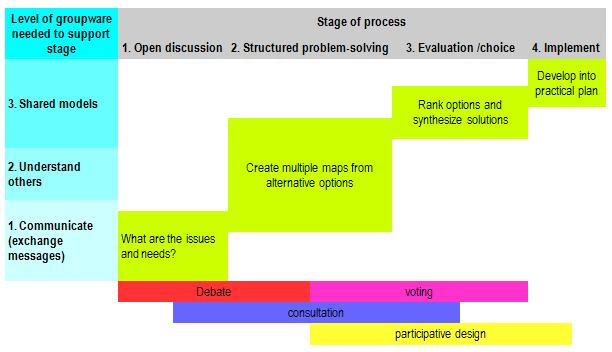Difference between revisions of "Technology matching for E-consultation"
(New page: ==Technology Matching for E-Consultation== There are hundreds of potential electronic communication technologies that could be used to support different parts of a consultation. So how ca...) |
(→References) |
||
| (5 intermediate revisions by the same user not shown) | |||
| Line 1: | Line 1: | ||
==Technology Matching for E-Consultation== | ==Technology Matching for E-Consultation== | ||
| − | There are hundreds of potential electronic communication technologies that could be used to support different parts of a consultation. So how can people organizing a consultation choose appropriate technologies? One way, is to consider the stages of a policy-making cycle: agenda setting, analysis, formulation, implementation and monitoring (Macintosh, A. in OECD 2003). However, this takes only the perspective of the consultation organiser, not the consultees. It defines the problem as one of information management in public administration. Another approach is to conceive of consultation as a process analogous to mediation and negotiation, through which different groups come to an accommodation of what should be done (Morison and Newman, 2001) as shown in the following table. | + | There are hundreds of potential electronic communication technologies that could be used to support different parts of a consultation. So how can people organizing a consultation choose appropriate technologies? One way, is to consider the stages of a policy-making cycle: agenda setting, analysis, formulation, implementation and monitoring (Macintosh, A. in OECD, 2003). However, this takes only the perspective of the consultation organiser, not the consultees. It defines the problem as one of information management in public administration. Another approach is to conceive of consultation as a process analogous to mediation and negotiation, through which different groups come to an accommodation of what should be done (Morison and Newman, 2001)<ref>Morison, J. & Newman, D. R. (2001) ‘On-line Citizenship: Consultation and Participation in New Labour’s Britain and Beyond’, International Review of Law Computers & Technology, 15(2), 171-194 </ref> as shown in the following table. |
| + | |||
| + | '''Table: Stages in consensus-forming consultations (from Morison and Newman, 2001)''' | ||
| + | |||
| + | [[Image:Stages_in_consensus_making.JPG|Center| Stages in Consensus Forming Consultation]] | ||
| + | |||
| + | |||
| + | ==References== | ||
| + | <references /> | ||
Latest revision as of 22:17, 14 April 2008
Technology Matching for E-Consultation
There are hundreds of potential electronic communication technologies that could be used to support different parts of a consultation. So how can people organizing a consultation choose appropriate technologies? One way, is to consider the stages of a policy-making cycle: agenda setting, analysis, formulation, implementation and monitoring (Macintosh, A. in OECD, 2003). However, this takes only the perspective of the consultation organiser, not the consultees. It defines the problem as one of information management in public administration. Another approach is to conceive of consultation as a process analogous to mediation and negotiation, through which different groups come to an accommodation of what should be done (Morison and Newman, 2001)[1] as shown in the following table.
Table: Stages in consensus-forming consultations (from Morison and Newman, 2001)
References
- ↑ Morison, J. & Newman, D. R. (2001) ‘On-line Citizenship: Consultation and Participation in New Labour’s Britain and Beyond’, International Review of Law Computers & Technology, 15(2), 171-194
